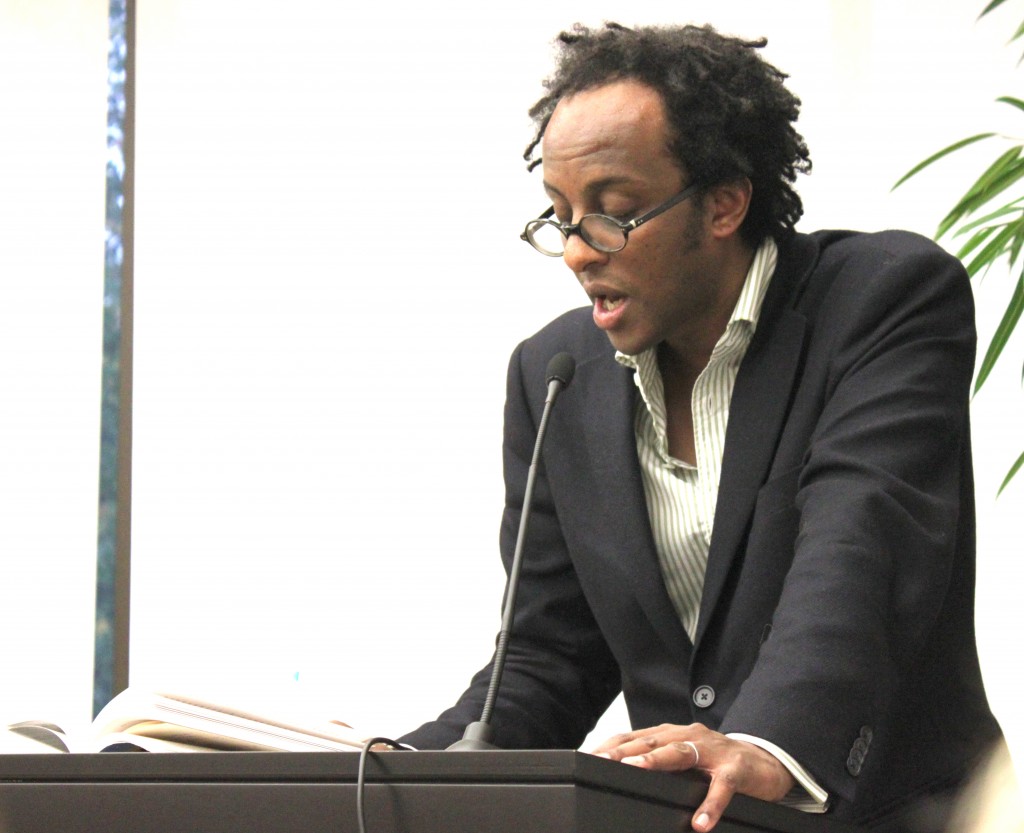Dinaw Mengestu is a critically acclaimed, award-winning novelist, one of The New Yorker’s “Twenty Under Forty” young writers and the author of two hauntingly beautiful novels that explore questions of displacement, identity and culture. He is an immigrant to the United States from Ethiopia, an expatriate from America to France and a self-proclaimed fan of gin-and-tonics. Dinaw Mengestu is a storyteller.
On Wednesday, October 19, Mengestu gave a reading in the Charles Chu Room in Shain Library to a crowd of students and faculty, described by Professor Jeff Strabone as an “enthusiastic turnout.” Anna Williams ’13 attended the reading even though it was not required by any of her classes. “Some of my friends had read his work and really enjoyed it, and I thought it would be a great opportunity to hear a successful writer talk about his work firsthand,” she said.
A group of students from Professor Strabone’s African Novels class and Professor Blanche Boyd’s Writing Seminar were fortunate enough to meet with Mengestu for an hour before the reading, during which his novels and his work were discussed in depth, followed by dinner.
Mengestu’s first novel, The Beautiful Things That Heaven Bears, tells the story of Sepha Stephanos, an Ethiopian man living in Washington, D. C., searching for a place for himself in America. His second novel, How to Read the Air, follows Jonas Woldemariam, the son of Ethiopian immigrants to America, as he struggles to fill in the gaps in the stories of his parents’ lives.
Despite writing about characters that are immigrants to America and, despite being an immigrant himself, Mengestu rejects being classified as “an immigrant writer.” During the talk before the reading, Mengestu spoke about his strong opposition to the categorization of his novels as “immigrant novels.” “I hate that term. I write novels with immigrant characters, but the lives of these characters aren’t defined by or dependent upon them being migrants; these characters are from Africa, but are telling an American story.”
He joked about the tendency of critics and readers to impose his biography on his narratives, and said, “I could write a novel about a group of white, middle-aged women in Connecticut, and the reviewers would say that I was finding a new way to tell an immigrant story.” He expressed his appreciation for the American literary canon as being flexible enough to include the work of immigrants. “America is a unique nation in that its literary tradition is not defined by origin and is always growing in scope and diversity.” Mengestu also stated that he feels more American after each book he writes.
When asked why he decided to become a novelist, Mengestu spoke about his lifelong search for narrative and identity, and revealed that he writes to make sense of the world and his place in it. Almost jokingly, he said, “I grew up hearing a lot of stories about Ethiopia. No, wait, I’m lying already—I didn’t hear any stories about Ethiopia when I was growing up, it just sounds more romantic to say that. All I had, really, was a list of names and no real narrative.” So he began to write, creating stories in order to understand his own place in America.
Before he began reading from his second novel, Mengestu described the book as an argument for fiction, saying, “The stories we create have just as much meaning as the truth, as long as they are real to us.” He prefaced the reading with a disclaimer that the book is not autobiographical. He then delved into a rhythmic reading of a particularly striking chapter, in which the novel’s protagonist invents and shares the story of his father’s escape from Ethiopia with his students. The author admitted to “stealing details” from his own life to create his stories, and about how the people closest to someone are often the biggest mysteries.
Mengestu discussed his writing process with the students who met with him before the reading, and explained he usually writes from beginning to end, guided consistently by the voice of the novel’s protagonist. “My books begin with a character, a voice,” he explained, “I write to figure out what the voice is saying.” He attributed the failure of his first attempted novel to its lack of strong characters and dependence on ideas and abstraction to tell a story. “I was afraid to create strong characters that were similar to me, yet still fictional. I couldn’t turn my family members’ narratives into fiction yet.”
His first successful novel, however, was heavily indebted to his family members and their stories; he named the characters after his relatives and interviewed his family in order to finally hear the stories that he grew up without. He spoke about the reactions of his family members to his utilization of their lives in his work, and said, “I think they were just happy that I cared. I was telling the stories that they were incapable of sharing and, in a way, was making their narratives permanent.” He cited authors like V. S. Naipaul and Saul Bellow as major influences and even, somewhat jokingly, alluded to undertones of Chaucer in his work.
Mengestu described his writing and his construction of his own identity as “a way to reconcile an Ethiopian past and an American present.” He talked about America as the only country in which an immigrant can will himself into becoming an American, and said that his idea of the American dream is not defined by the acquisition of material goods, but rather by becoming a part of America. “The objects of life are not life,” he said. •










